Bref clip de Robson avec Val McDermid lors du 'Crime Weekend' :
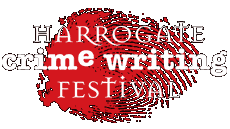

INDUSTRY FORUM : MAKING IT FOR THE SMALL SCREEN ORIGINAL SCRIPT OR ADAPTATION
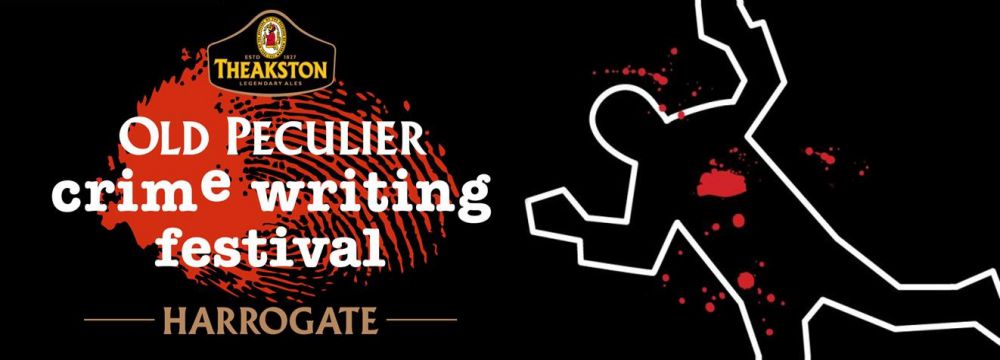
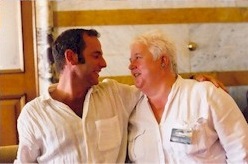
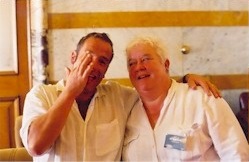
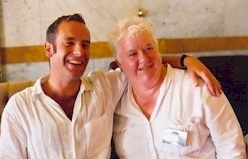
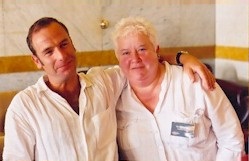
Harrogate est une station thermale située dans le comté du Yorkshire du Nord où se tient chaque année un festival de renommée internationale qui n'a pas son pareil.
Depuis 1966, la ville accueille en Juillet le Theakston Old Peculier Crime Writing Festival dans le cadre prestigieux de l'hôtel victorien Old Swan.
Harrogate est le cadre idéal pour ce "weekend du crime" puisque c'est le cœur d'un mystère… En effet, c'est ici, en 1926, qu'a été retrouvée Agatha Christie au Old Swan Hotel après sa disparition inexpliquée de son domicile du Surrey.
Les plus grands noms de la littérature policière se retrouvent pendant trois jours exceptionnels, le temps de 18 événements, de rencontres, de tables rondes, d'interventions et de signatures. Val McDermid est une fidèle de Harrogate depuis des années.
Du 17 au 20 Juillet 2003, Robson Green, en tant qu'acteur principal de la série dans le rôle du Dr Tony Hill ainsi que producteur au titre de Coastal Productions, Sandra Jobling, productrice exécutive de Coastal et l'auteure à succès Val McDermid, étaient présents pour la récente adaptation de Wire in the Blood.
Second Industry Forum :
With Sandra Jobling, Robson Green and screenwriter Stuart Hepburn and Bill Boyes producer at the BBC was an absolute must for every screenwriter.
As finally everyone had been seated and Robson Green had been pleading all those present to stop staring, Val McDermid introduced each one. Robson Green was the last one in the line and of course it was met with applause.
Robson immediately seized the opportunity and stood up just to say "goodbye, thank you, and good night !" It was 10.30 a.m. and of course he didn't leave.
Stuart Hepburn opened it with an example of what all is needed to start a production: Good screenplay, a lot of very important people who believe in it and a lot, I mean a lot of money, and then if you can convince a famous actor to be in maybe there is a chance that something very good will be done. As he mentioned the famous actor, Robson made big sighs, smiling broadly.
But Stuart fixed him with a strong eye and explained that he meant a really well-known actor. Robson swore revenge.
But one thing Stuart Hepburn made absolutely clear. A screenwriter has to put away his ego. He has to write exactly what the producer wishes and, if necessary, 35 times the same thing (Oh yes, I can just say that's true!) But even after that you can feel that they really love their job.
Also, Sandra Jobling told us stories about the production of 'Wire In The Blood' with such an enthusiasm that she could hardly remain sitting on her chair, or how hard it was to get permission for a scene with an explosion or to convince co-producers.
Oh yeah - the explosion ! Sandra Jobling was fighting for months to get the permission and then - you certainly (surely) remember Alan Sinclair's pictures. Do you? Yes, it was that day and I understand now why Robson looks that seriously.
The scene was very well prepared and it had been done. But immediately after the big detonation it was clear that something was wrong. The explosion was too heavy and for a long time they didn't know if all actors were alright.
Robson became very vivid as he explained that on that day they didn't only lose many spotlights and 'gaffers' but also two cameras, a lot of important material and four stunt men (he really said so).
But what is it that makes them work so hard? According to Sandra Jobling it's in the end all a matter of feelings. When she reads a book or screenplay and if there is something that she is seized by, sometime it's just the feeling that it will work, then she gives the book to Robson and if it has the same effect on him, the game can start.
You should have been there and seen them. You could really see energy growing up and it was only theoretical. So, if it's real, it will certainly be much stronger and it has to be like that.
They put their heart and soul into it. Enthusiasm and the big, big desire to see it on the small screen, that's the fuel for a very, very long time and without it nothing will be done (happen). It's the same for the plot - the story. Bill Boyes made it clear that the plot must endure real hard stuff for months.
It has to bear to be abridged and to be rewritten over and over again. If it's too fragile, it will lose its life and that means "game over". In an adapted screenplay you will find only 30% of the original novel.
Fancy. Fancy is one of the important things in Robson Green's choice for a part. Also, when reading a book, he must see himself in the role and then the desire might come up to play the character.
And if there is a real interesting relationship between the protagonists like in 'Wire' - Carol and Tony - it will be just perfect. With all that he is ready to even fight for the 'smallest things' like a kiss, if necessary.
Should they kiss or not? Of course not he said. If they don't kiss, you keep their relationship even stronger.
Oh yeah, and one of the reasons why he liked to be Tony Hill was because he looks good as Tony (Ok, everyone has his own judgement.)
How does he prepare for a role ? Once he really has internalized the part, he looks for the appearance and it can be like it was for Tony Hill, that he just sees the right person walking in front of him.
In that case, it was a professor wearing a raincoat, with a plastic bag in his hand, toddling along. Robson immediately knew that's exactly how Tony would look like.
Acting, facing the camera, how does he do it that his feelings are so real? He said he doesn't play, on the set everything surrounding him is made to create the necessary feelings so they have to be there, he can not feign to cry and that 12 times one after another.
He really cries because he really feels like this in that moment. And about fear? He just mentioned everybody in here who has children knows what fear is like.
Oh yeah, but one time he said he didn't have the real feelings for a scene. It was in 'Wire in the Blood'. He showed us how he was hanging naked in the cellar and was kissed by his kidnapper and all he could think of was: "Oh my God, what will my father think about me now ?"
How important is the director? He is important but also important for Robson Green is to know exactly what the camera does, how it moves. One of the first things he had done when he started as a TV actor was to buy books about cameras to learn everything about them.
And it can be very confusing if your director looks at you playing and you can see that he just falls asleep. Very, very confusing. OK, it was a very, very hot and sultry day.
I think Robson Green has a very special ability. Although he can hardly change his appearance, maybe his hair is just a little bit longer or shorter, he does surprise me at each time how strange and different he can look.
It's just the little things, a different way of walking, new posture, and that's just what I really like. Robson Green said his goal is to be able to play with an absolute minimum of gestures but to give a maximum of feelings just by the expression of his eyes, like Paul Newman.
I can say he has reached his goal. Oh yes, he definitely has. Oh, and by the way, I mustn't forget (for the second time). I just want to say thank you - many thanks to Val McDermid and Robson Green for allowing me to take these photos.
First Industry Forum :
Val McDermid opened the event by introducing herself and the panel of speakers: Stuart Hepburn, who has adapted Ian Rankin's and Christopher Brookmyre's work and written original screenplays including The Planman; Bill Boyes, executive producer at the BBC; Sandra Jobling, executive producer at Coastal Productions and Robson Green, also of Coastal Productions and Sandra's business partner "who briefly appeared in some famous drama called Wire in the Blood" - joked Val !
Val McDermid explained that what they would be talking about today was the process of adaptations; how do you start off with a novel and then end up with something that works on television ?
Sandra Jobling talked about the initial process of how the idea of making a drama from a novel actually comes about, and how that progresses to getting it commissioned for TV. Starting by working with the novelists agent and then, in the case of Wire in the Blood, it took 12 months to get ITV on board with the project.
Ultimately, after working with a drama daily from its initial conception, and becoming passionate about "the baby" - it makes you blind to the views of the public and you never know how it's going to be received until it's actually been shown.
Bill Boyes talked about the process the TV networks play in commissioning these dramas, including the costs that are involved. Asking himself about the characters that are presented to him is very important - "do I want to spend the next hour or so watching them on TV and do I want to tune in next week to see what happens to them next", that's very important.
It can cost up to three quarters of a million pounds to show an hour of drama on network TV in Britain at the moment, making it important that he's passionate about what he commissions. It's a lot of money to invest in an idea only to find when it goes out on TV and it bombs - that's the pressure faced.
Stuart Hepburn talked about the process of getting the actual novel transformed into a screenplay, and how he needs to reduce 500+ pages of a novel down to about a 100, and then that will eventually become 40 for the actual screenplay. He works in 3 stages - reading the novel for the first time from a readers perspective, then going back and reading it again with a highlighter for dialogue and relationships between the characters and then, for a third time, reading it again to pick out the plots and sub-plots.
He will forget the novel and not go back to it so that he can write the final screenplay from scratch, with the details he has highlighted from his readings, ensuring that the writing works as a screenplay and not what people have read in the actual novel.
Val commented on this aspect of the process. The novel is stripped back to a stage where sometimes it is barely recognisable, which is where her close involvement with Coastal worked so well as she was involved at every stage along the way, ensuring that everything was true to the characters even though the story may change.
The final stage of the process is where the actor comes in. Robson talked about how important the writing is and how easy his job becomes with good writing. He liked the fact that with Val's books the excellent visual grammar was already there and it wasn't hard to learn.
Val asked if he had to "look inside" himself for aspects of characters like Tony Hill and the answer was absolutely not - he met Julian Boon, a psychologist, and took from him what he required for that aspect of his role and all he needed was himself - joking that his "body was his tool"!
Val then asked the panel if anything went wrong in the process and Sandra recalled an incident which was reported earlier this year in the Newcastle Evening Chronicle. The director had wanted an explosion scene in an old hospital - but it had to be one particular hospital, which they could only use for two days as it was due to be handed over to the health trust and then demolished on the third day. The scene was all set for the explosion - camera, action - and the button was pressed.
Everyone stood in awe at the explosion - until it went on... and on... and on...! Robson told us that it was only supposed to be a small explosion that blew the doors open - but it actually blew the roof off, and things became quite fraught as there were actors inside which nobody could see for smoke and dust.
Ultimately, everybody was fine but the shoot was almost closed down by Health & Safety, which would have endangered the whole project because of the financial implications - but Robson joked that he "prostituted" himself and asked the Health & Safety executive if his wife liked Robson and would she like to speak to him!
The audience were then invited to put their questions to the panel before the event was drawn to a close. Val and Robson then went to autograph books and pose for photographs with the public.
During three fabulous days, the only thing I really cared about was how to commit the perfect crime. But no ! Please - don't be afraid, don't worry - it's just in my head. All that expenditure in order to write the right crime novel !
Harrogate's first Crime Writing Festival from July 17 - 20, 2003 gave us the extraordinary opportunity to be face to face with some of the world's best crime writers like Val McDermid, Jeffery Deaver, Reginald Hill, Ian Rankin, Peter Robinson, Karin Fossum... or Colin Dexter and Chris Burt who told us many lovely anecdotes about Inspector Morse.
They all showed a real sensibility and talked very honestly about things like why they write, how they write or why the story plays in certain places and not anywhere else.
Very thrilling was the Industry Forum: How to get published in the crime world ? But at the same time it put us back down to reality. To find a publisher is like playing the lottery.